Picking a project management app is like wandering through the story of Goldilocks—there are so many options and no perfect fit. It feels like you’ll always be sampling scalding porridge and trying to get comfy in a doll-sized bed.
Asana is a quality option (so much so that it’s made Zapier’s list of the best free, small business, and enterprise project management apps), but that doesn’t mean it’s guaranteed to work for you. That’s why I rounded up ten of the best alternatives to Asana, so you can pick the one that’s just right.
The best Asana alternatives
What is Asana?
Asana is a project management app that manages to be powerful and flexible enough for teams of all sizes—while being intuitive and streamlined enough for beginner users to enjoy out of the box. Here are some of its primary features:
-
“My Tasks” page showing each user’s assigned work
-
Personal dashboard with customizable widgets
-
A variety of views (including lists, Kanban boards, and calendars)
-
Robust reporting
-
Team workload planning
-
Goal-tracking and portfolio management
-
Team messaging
-
Powerful native integrations (along with an integration with Zapier)
If you want to try Asana on for size, you can get started on the free plan. From there, paid plans start at $10.99/user/month for more advanced views, workflow automations, and security.
But even the perfect porridge isn’t for everyone (forget the temperature—give me toast and scrambled eggs any day), and Asana may not be what you’re looking for. Keep reading to see the Asana alternatives you might consider exploring instead.
The best Asana alternatives at a glance
|
Best for |
Standout feature |
Pricing |
|
|---|---|---|---|
|
Kanban lovers |
Unlimited Power-Ups and custom automations |
Free plan available; Paid plans start at $5/user/month |
|
|
Straightforward to-do lists |
Natural language processing for quick task addition |
Free plan available; Paid plans start at $4/month |
|
|
Simple project management |
Prioritizes simplicity and visual project tracking |
Paid plans start at $15/user/month |
|
|
Database lovers |
Highly customizable data management |
Free plan available; Paid plans start at $20/user/month |
|
|
Managing multiple clients |
Focus on client management and billable hours tracking |
Free plan available; Paid plans start at $5.90/user/month |
|
|
User-friendly work management |
Collaborative features and customizable views |
Free plan available; Paid plans start at $9/user/month |
|
|
Robust free plan |
Extensive customization options and generous free features |
Free plan available; Paid plans start at $7/user/month |
|
|
Enterprise teams |
Spreadsheet-like interface with project management features |
Free plan available; Paid plans start at $7/user/month |
|
|
Advanced AI features |
Useful AI functionality with Copilot feature |
Free plan available; Paid plans start at $6.99/user/month |
|
|
DevOps teams |
Designed for engineers and developers, extensive integrations |
Free plan available; Paid plans start at $7.75/user/month |
An Asana alternative for Kanban lovers
Trello
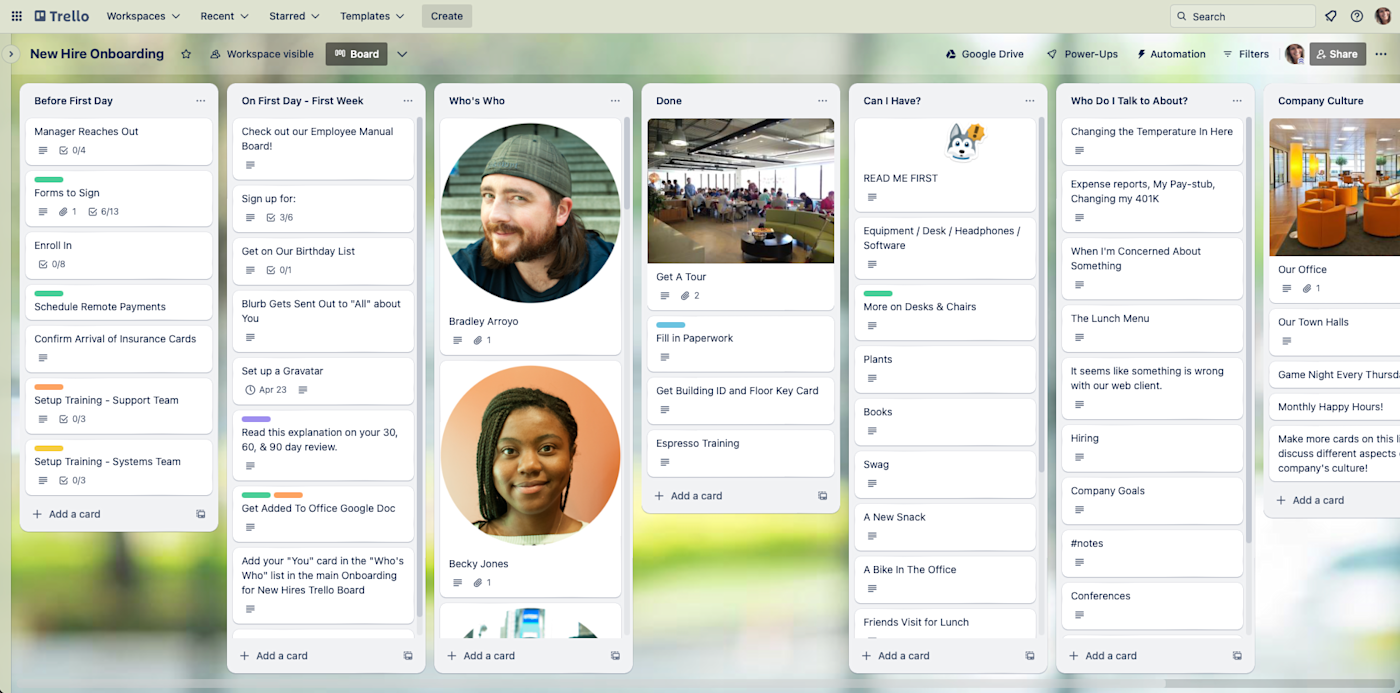
Trello pros:
Trello cons:
While Asana offers Kanban views for projects, Trello is built around Kanban workflows. It lets users create boards and sort cards into lists on each board. You can choose from dozens of board templates or build your own from scratch, then create columns (called lists) for your tasks—like To-Do, Doing, and Done. Each task is a card, where you can easily attach documents and images, add due dates and labels, and create custom properties. You’ll drag and drop cards across lists on the board as they change status.
The tool comes with plenty of Power-Ups, which are a mix of additional features and integrations with other apps. Even on the free plan, you can use unlimited Power-Ups to customize boards to your needs—adding anything from card repeaters to calendars to Google Drive syncing.
Trello also lets you create custom automations that run based on project activity, like an approaching due date or when a card is moved between lists. You can even set up custom buttons for cards and boards that run an automated sequence when clicked. Individuals and small teams that don’t need Asana’s advanced template library and team management might be happy to trade those features in for Trello’s customizable Power-Ups and integrations.
If you want even more flexibility, you can use Trello’s Zapier integrations to connect Trello to your most-used apps, like Google Calendar and Slack. Or check out these other ways to automate Trello.
Trello pricing: The free plan includes 10 boards per workspace, unlimited cards and Power-Ups, and 250 automated commands each month. Paid plans start at $5/user/month for unlimited boards, advanced checklists, custom fields, up to 1,000 automated commands per month, and more.
An Asana alternative for a straightforward to-do list app
Todoist
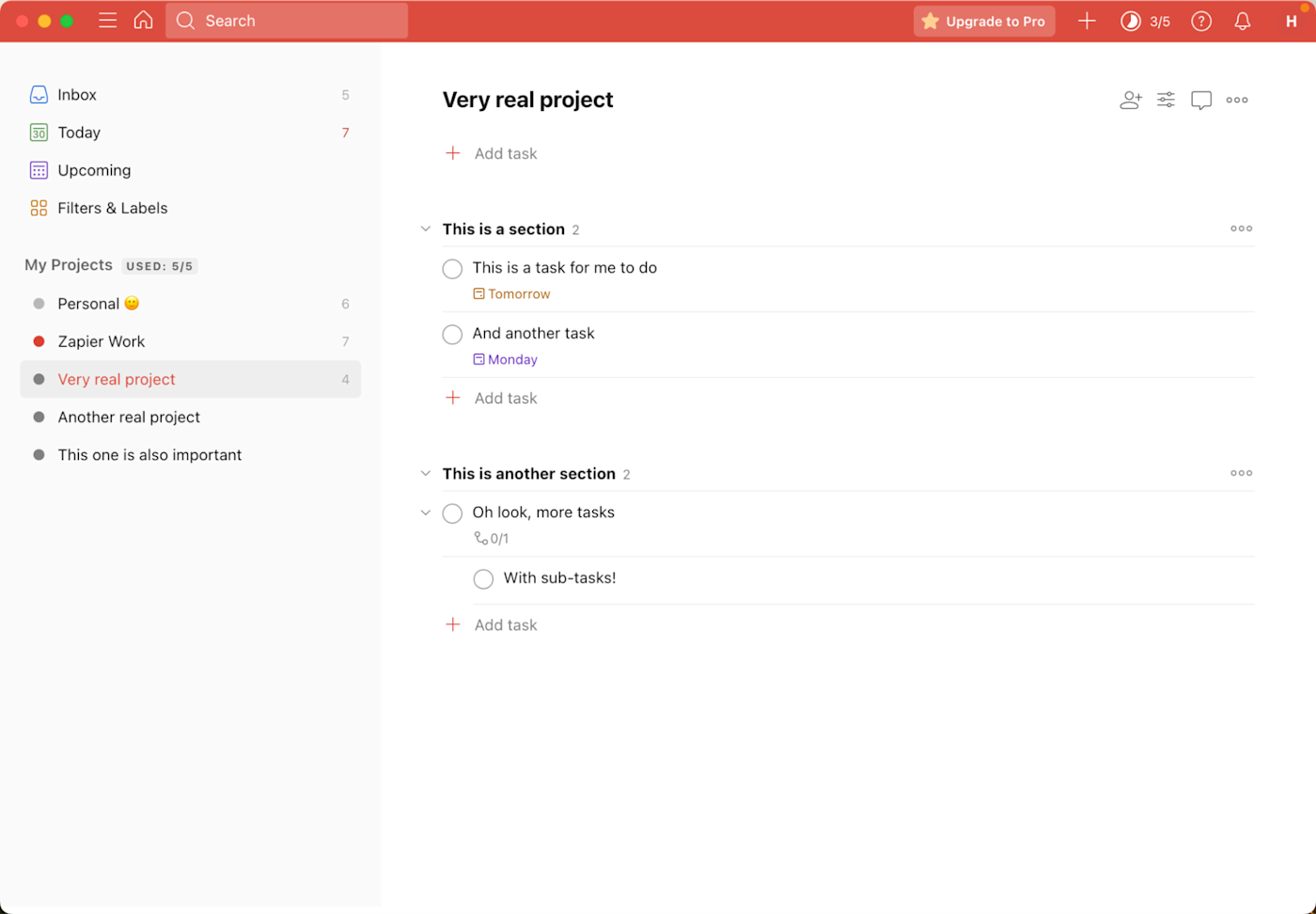
Todoist pros:
Todoist cons:
I often find myself going down the feature rabbit hole in project management apps—in those cases, a simpler to-do list app comes in handy. Todoist is one of the best to-do list managers out there, thanks to its natural language processing feature that lets you add and organize tasks with a few keystrokes. Type “call Mom this weekend” and the task “call Mom” will be set due on Saturday. You can even add more complex recurring due dates, like “every Tues, Thurs, and Sat for 4 weeks”—and Todoist will date that task accordingly.
Todoist is also available on just about every platform imaginable, so no matter where you are, you can brain-dump new tasks in seconds, without interrupting your flow more than necessary. Easily sort tasks into projects, and if you’re a paid user, create custom labels and filters that let you stay even more organized. You can view tasks in list, Kanban board, and calendar format, and the AI assistant on paid plans helps generate tasks for you based on a prompt. While Todoist lacks Asana’s powerful automation and collaboration features, it’ll keep you organized without the bells and whistles.
Todoist has a few native integrations, but its built-in automation options are much more limited compared to Asana. But since Todoist integrates with Zapier, you can easily connect your to-do list with your other favorite apps. Check out some ideas for automating Todoist with Zapier, or give one of these examples a try.
Todoist pricing: Free for up to 5 projects and 3 filter views; paid plans start at $4/month for up to 300 projects, calendar layouts, and AI features.
An Asana alternative for simple project management
Basecamp
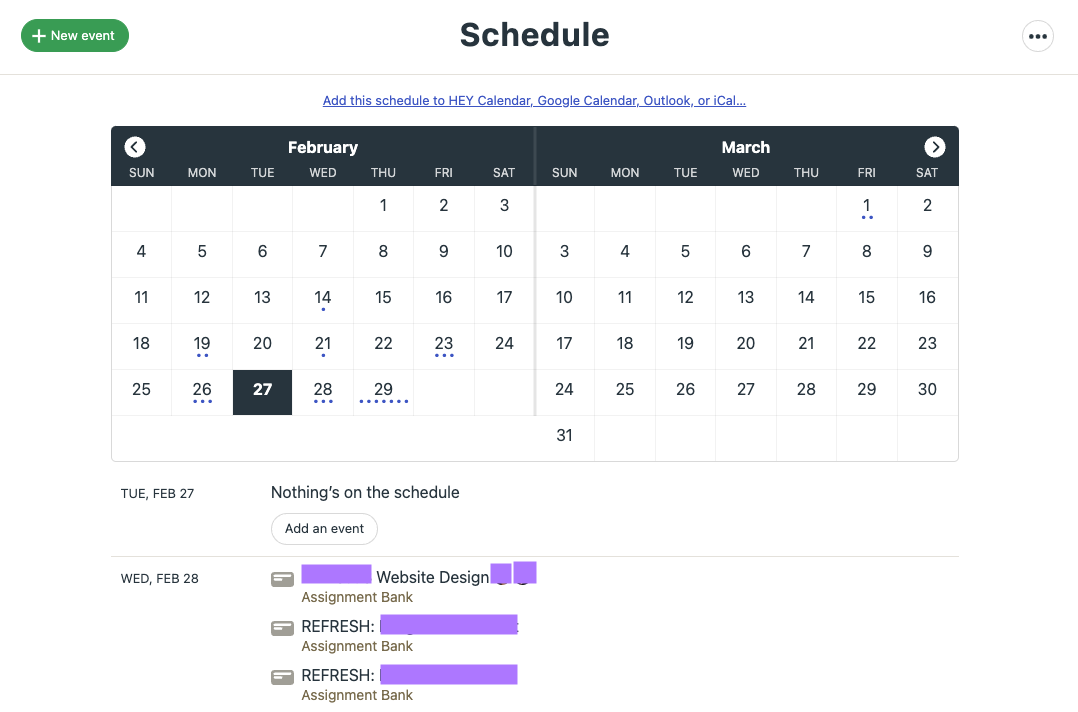
Basecamp pros:
-
Prioritizes simplicity
-
100 native integrations, including Zapier
-
Cost-effective for solo and team users alike
Basecamp cons:
Where Asana shines in its ability to handle complex projects with lots of tasks, Basecamp focuses on the big picture. It has a simple interface—which can be frustrating if you like having multiple ways to customize views and workflows but works well if you prefer a tool that keeps everyone on the same page.
Basecamp offers list, Kanban, timeline, and Gantt chart views for projects. You can also attach project-level documents in the Docs & Files section. The tool’s folders, sortable views, and color-coding make it easy to store and find important information across projects.
While switching between views and filtering for individual tasks is a little more complex than in Asana, Basecamp makes it easy to monitor project progress at a high level. The Move the Needle feature visualizes project status as a color-coded gauge showing whether the project is on track, at risk, or a concern. So if you’re looking for a simple tool that prioritizes basic workflow tracking and big-picture projects for your team, Basecamp might be for you.
Basecamp offers plenty of native integrations with popular apps, and with Basecamp’s Zapier integration, you can connect your project manager to all the other tools you use, too. Here are a few examples.
Basecamp pricing: No free plan available. Paid plans start at $15/user/month, or $299/month for unlimited users.
An Asana alternative for managing a lot of data
Airtable
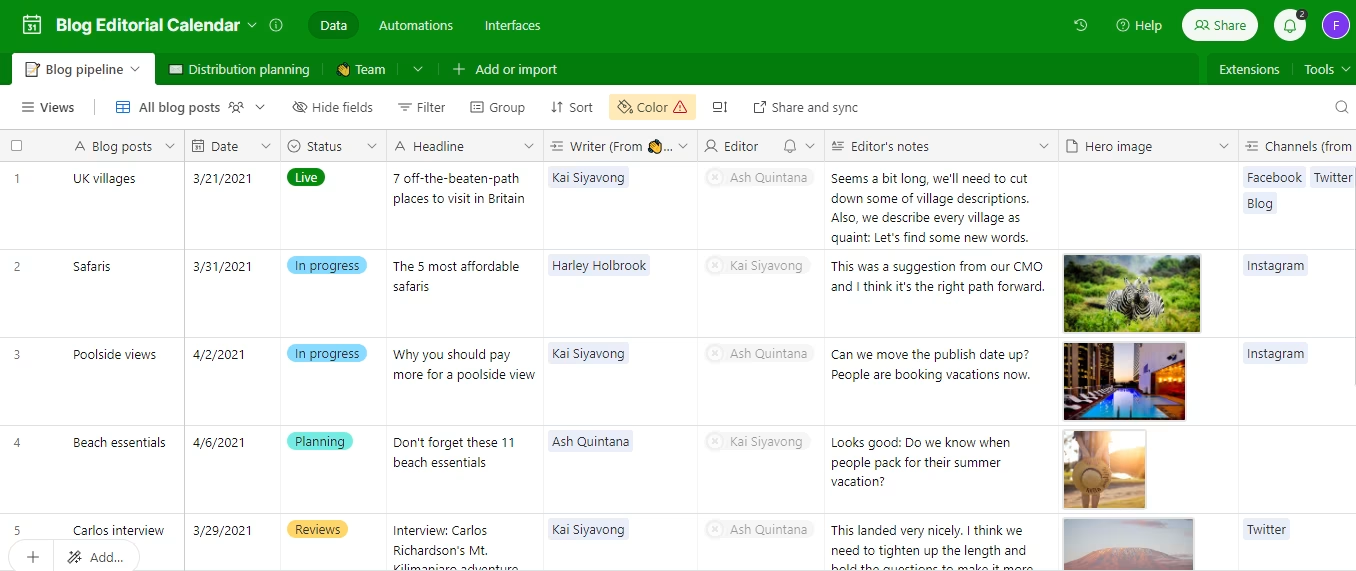
Airtable pros:
Airtable cons:
-
Steeper learning curve
-
Expensive paid plans
If you’re looking for a project management app that leans more toward data management, try Airtable. Out of the box, Airtable’s default view looks like a spreadsheet. It offers a few project templates based on your team type (such as marketing or sales), or you can build a “base” from scratch. From there, you can add highly customizable fields (or columns) to each row, so it’s easy to turn Airtable into a robust project management app with due dates, assignees, and attachments. And there are plenty of customizable view options that let you view projects in Kanban, Gantt, calendar, gallery, or timeline format.
Because Airtable has a database-like structure and so many advanced customization options, it has a steeper learning curve than Asana. But if you’re not opposed to a little grunt work on the front end, the platform is flexible enough to meet almost all of your needs.
Airtable even offers more than 80 apps to help you enrich and integrate your projects—or you can build your own custom app. And because Airtable integrates with Zapier, you can connect your databases to the rest of your tech stack with ease. Give one of these examples a try, or learn more ways to automate Airtable.
Airtable price: Free for up to 5 users. Paid plans start at $20/user/month for additional views, 50,000 records per base, 20GB of attachments, and more.
An Asana alternative for managing multiple clients
Paymo
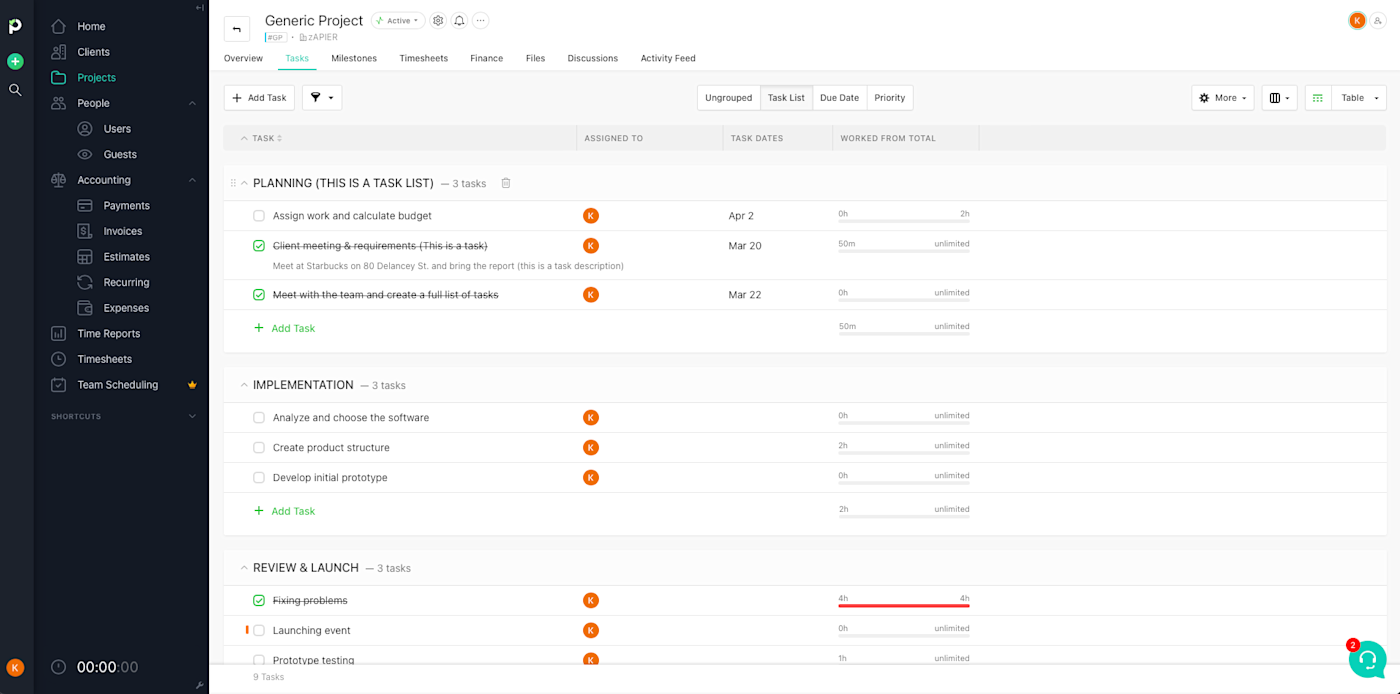
Paymo pros:
Paymo cons:
Asana excels at cross-functional project management, but Paymo is a great choice if you’re a freelancer or small business owner who wants to manage projects, billing, and invoicing across several clients. Each project is set up per client, and you can assign billable rules (like flat fees or hourly rates) to projects if you prefer. And as you work on a project, you can use the tool’s built-in timer to keep track of billable hours—and Paymo can create invoices automatically based on that data.
Paymo’s project management interface isn’t as customizable as Asana’s, but it does offer five ways to view your project’s tasks and subtasks: table, list, Gantt chart, calendar, and Kanban board. And you can sort and filter tasks by client, status, due date, and more. There are also file storage and team communication features that make it easier to collaborate on client projects.
And with Paymo’s Zapier integration, you can connect it to tools like your calendar or accounting software. Here are a few examples to get you started.
Paymo pricing: Free plan available. Paid plans start at $5.90/user/month for unlimited clients and projects, additional views, guest access, and more.
An Asana alternative for user-friendly work management
monday.com
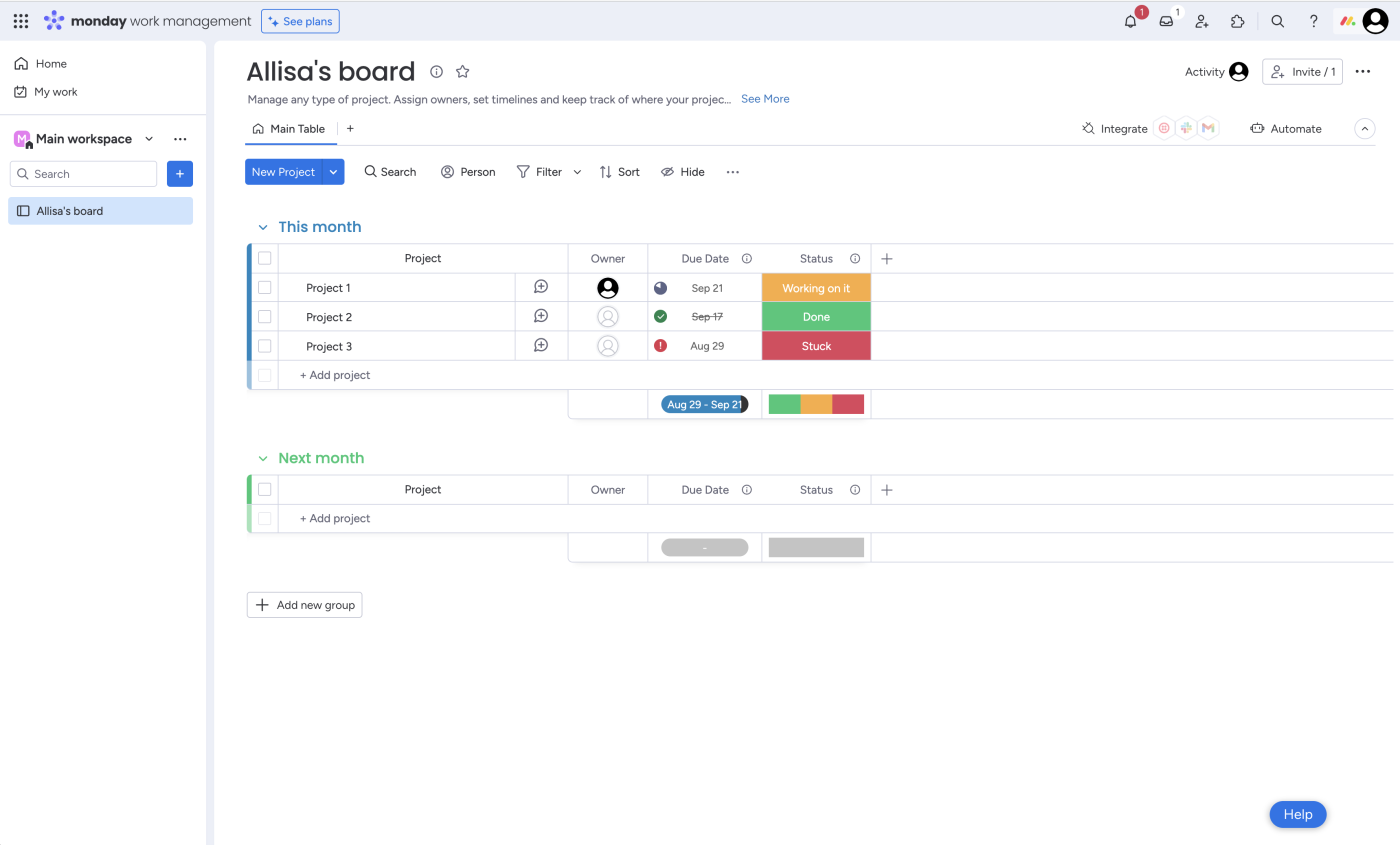
monday pros:
monday cons:
monday.com is billed as a work management platform, which goes beyond projects and lets you manage all of your team’s work in one app. Not only can you plan projects and assign tasks, but you can manage resources, track portfolios, and create business workflows to streamline operations across teams. monday might have a slightly steeper learning curve than Asana, but it’s much more flexible.
The tool has plenty of collaborative features, including integrated docs that you can create and collaborate on directly within monday. This feature is especially helpful for teams that keep in-depth documentation, style guides, and other resources closely tied to projects. You can even widgets and project views into docs, making them endlessly dynamic and customizable.
Because monday is built to help teams of all shapes and sizes get work done, you can customize the platform to your team’s specific needs. If you’re a project manager who doesn’t mind tinkering with every aspect of your tool’s setup, give monday a go.
monday also integrates with Zapier, which makes it easy to do things like create new tasks from a spreadsheet or calendar. Get started with one of these popular workflows, or learn more about automating monday.
monday pricing: Free plan available. Paid plans start at $9/user/month for unlimited items and viewers, 5GB file storage, and more.
An Asana alternative for a robust free plan
ClickUp
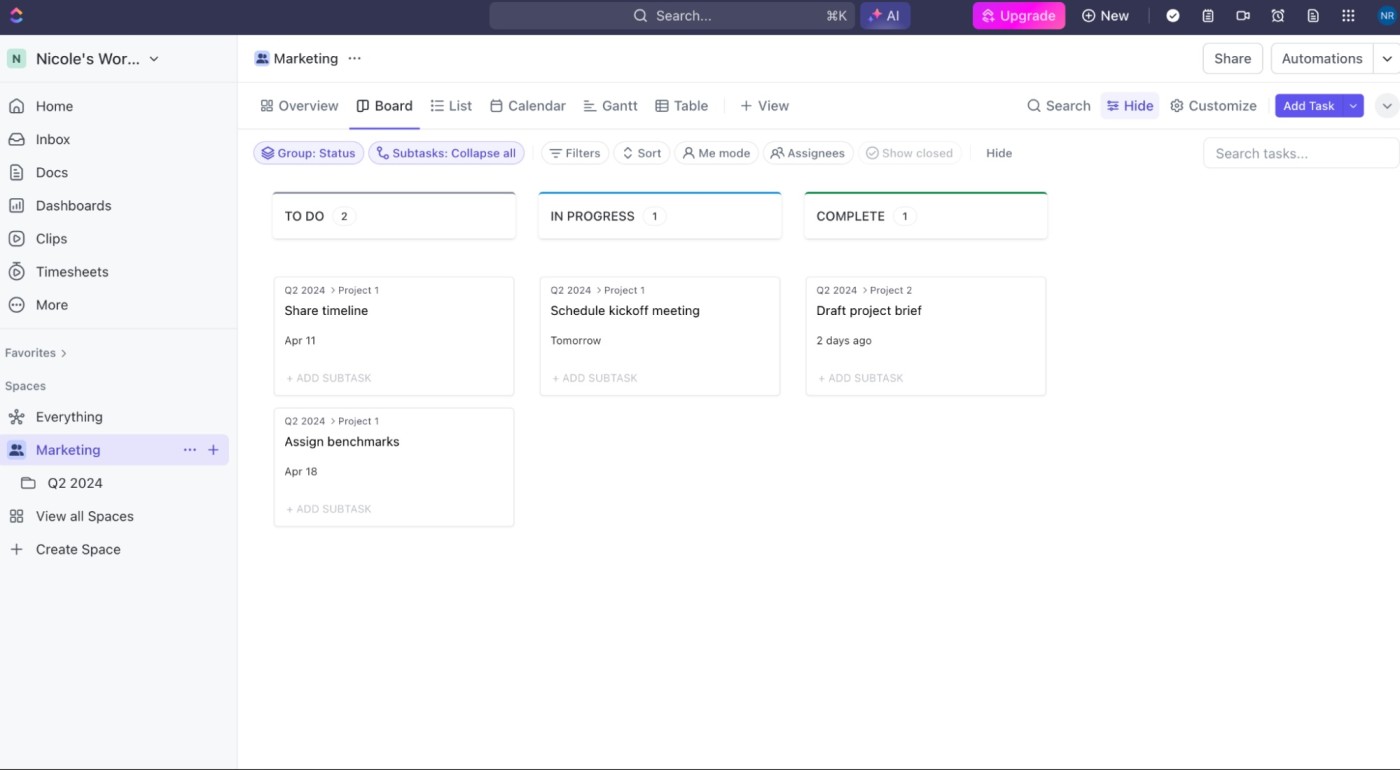
ClickUp pros:
ClickUp cons:
While we’re discussing work management apps, let’s talk about ClickUp. The tool’s tagline is “one app to replace them all,” and that might only be a slight exaggeration. Like monday, ClickUp lets you customize your own workspace, incorporating docs and wikis, time tracking, collaboration tools, and robust project management features.
But where ClickUp really shines is how much it offers for free. Asana’s free plan includes only basic features, and you have to pay for teams with over 10 members. But on ClickUp’s free plan, you can create unlimited tasks (with unlimited custom views) and invite unlimited users. Users can create up to 60 custom fields, use 100MB of file storage, and use 100 automation executions per month. And project views range from your standard list, calendar, and Kanban to more exciting options, like mind maps and whiteboards. You can even embed apps and websites within project pages, track time within tasks, and send chat messages and emails without leaving ClickUp.
Everything within ClickUp is customizable, from project hierarchies to task fields to dashboards. This makes the onboarding and setup process a bit more involved than a tool like Asana—but if you want granular control over your project management tool, you’ll probably be satisfied with the flexibility ClickUp offers.
For even more customizability, you can use ClickUp’s Zapier integrations to connect the tool with your favorite apps. Try one of the automations below, or learn more about how to automate ClickUp.
ClickUp pricing: Robust free plan. Paid plans start at $7/user/month for unlimited storage, integrations, custom fields, and more.
An Asana alternative for enterprise teams
Smartsheet
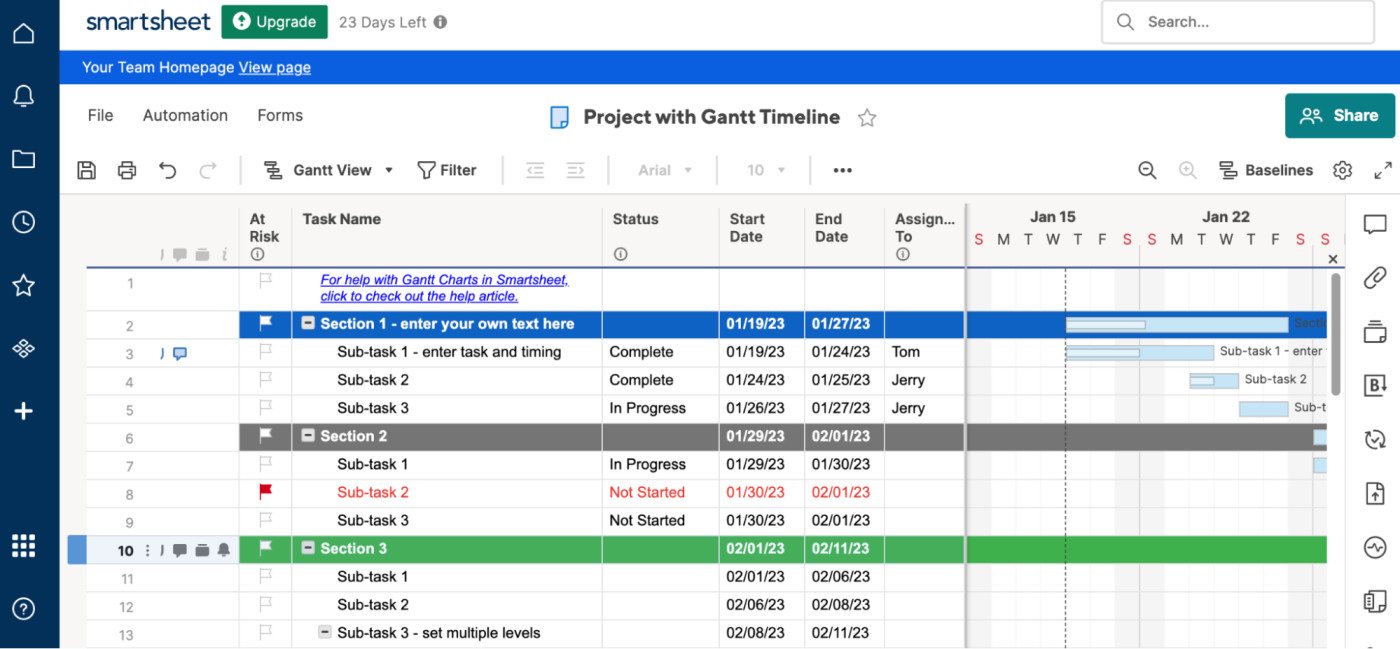
Smartsheet pros:
-
Plenty of project management templates
-
Reporting and insights features
-
AI formula creation and charts tools (in beta)
-
The most spreadsheet-like software for project management
Smartsheet cons:
Some bigger teams need more data management features than Asana offers—which is where Smartsheet comes in. The app combines the power of a spreadsheet with the flexibility of a project management tool.
The foundational element of Smartsheet is (unsurprisingly) the sheet. But once you input information and tasks into a spreadsheet, you can view them as a calendar, Gantt chart, grid, or cards. Further organize your data with smart columns and hierarchies, or use formulas and conditional formatting like you would with a Google Sheet.
Smartsheet is great for enterprise teams that want the versatility of Excel or Google Sheets alongside additional collaboration, visualization, and automation features. But that mix comes with a steep learning curve and a less aesthetically pleasing interface than other popular project management tools. While you can start using Asana without much frustration right away, Smartsheet takes some trial and error.
Smartsheet isn’t for everyone, but it’s a great option for teams that need robust data management features. If you’re a project manager for an enterprise team, you might prefer the spreadsheet-like interface and robust reporting features Smartsheet offers.
The platform has native integrations with popular apps like Slack, Jira, and Google Workspace, and its Zapier integration also lets you connect Smartsheet to the rest of your tech stack. Here are a few ways to automate Smartsheet, or you can get started with one of these templates.
Smartsheet pricing: Free plan available for 1 user and 2 sheets. Paid plans start at $7/user/month for 10 paid users, unlimited sheets and viewers, and 20GB attachment storage.
An Asana alternative for advanced AI features
Height
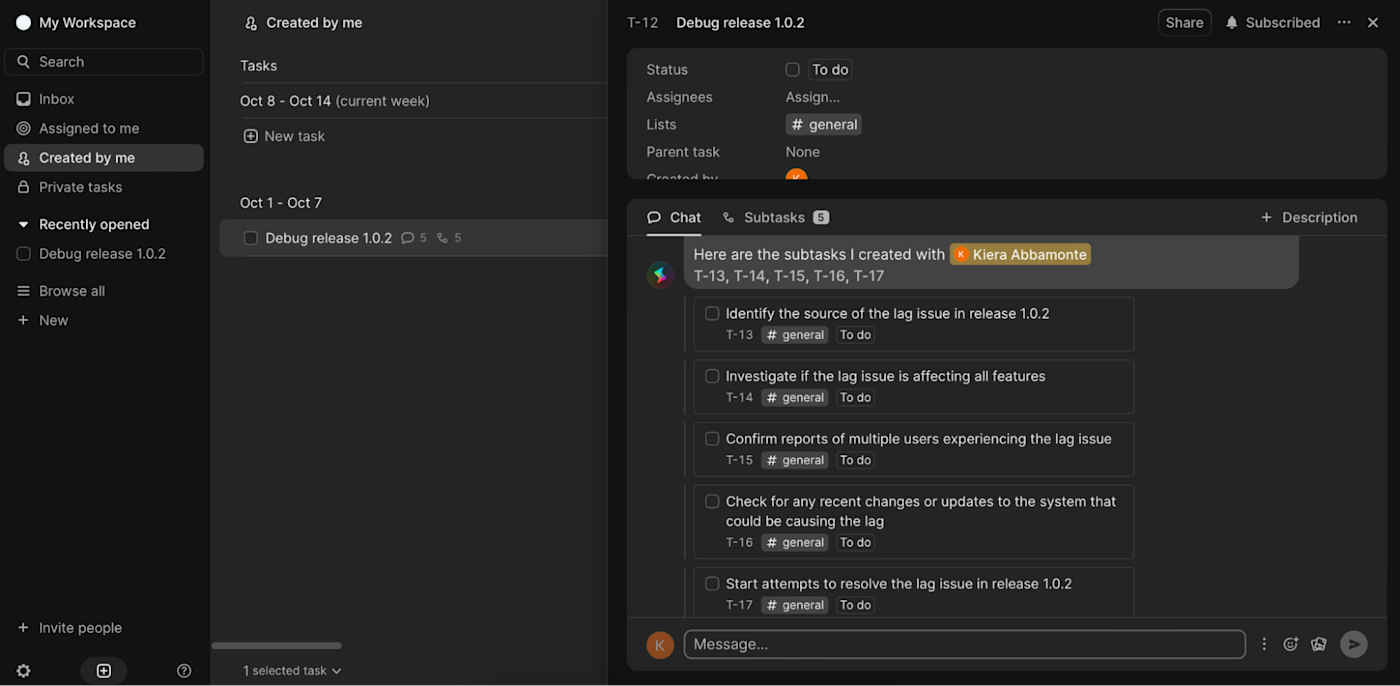
Height pros:
Height cons:
It seems like every tool is adding AI features these days, but some are more useful (and functional) than others. While Asana does have a basic AI assistant, Height’s AI features go even further—at least for now. Height’s Copilot feature creates subtasks from chat messages, generates summaries of a task’s chat history, auto-detects improvement suggestions, and more.
Overall, the tool’s interface looks a lot like Asana, with multiple task views including list, Kanban, Gantt, and calendar. Your team can collaborate using the chat feature, which lets you attach inline media, rich messages, and status updates. And Height’s extremely generous free plan allows for unlimited members, 100 monthly automation tasks, and access to Copilot.
Height also integrates with Zapier, which lets you automate notifications, task creation and more. Here are a few popular examples.
Height pricing: Free plan available. Paid plans start at $6.99/user/month for unlimited lists and tasks, 100 monthly automation runs per user, up to 100MB file uploads, and more.
An Asana alternative for DevOps teams
Jira
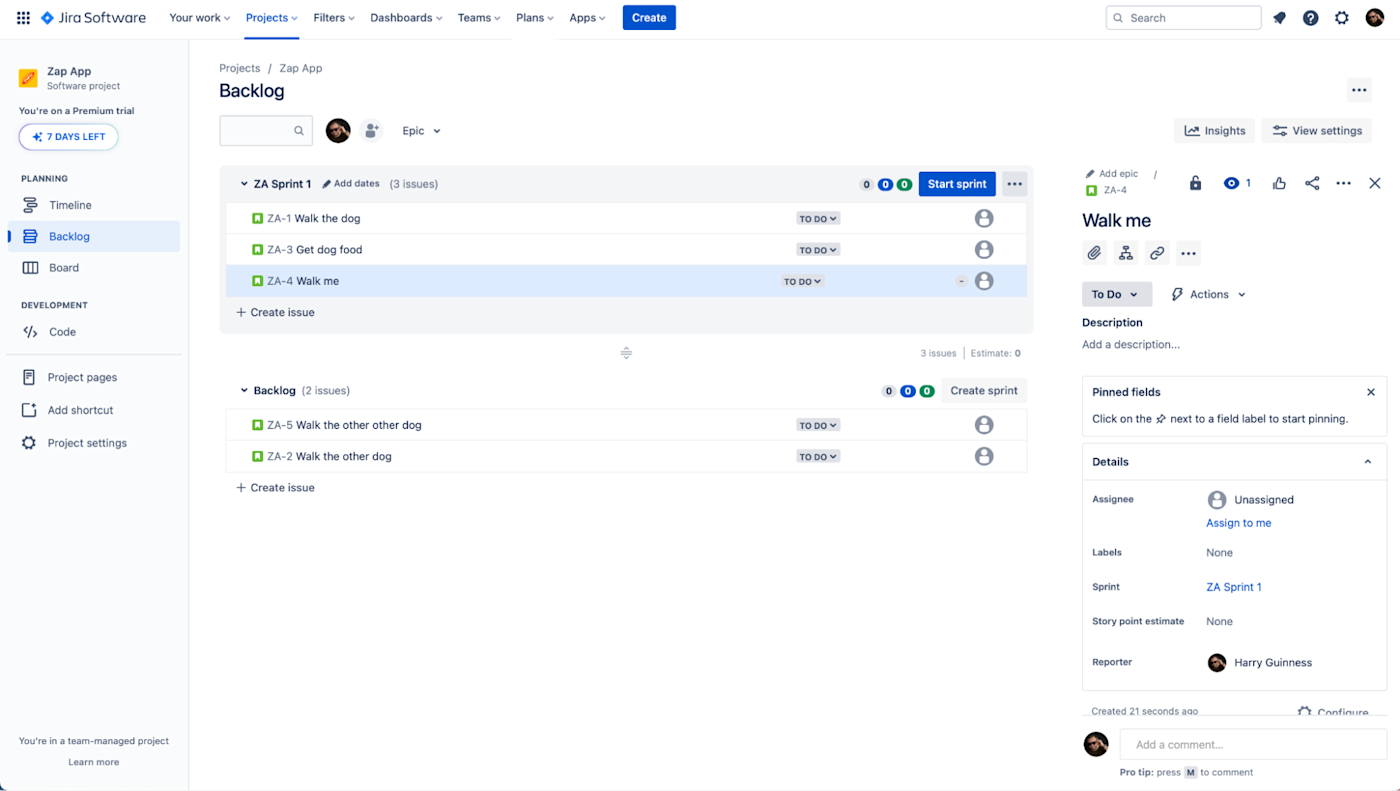
Jira pros:
Jira cons:
Unlike Asana, Jira was built specifically for teams that use Scrum and Agile workflows. When you sign up, you’ll answer a few questions about your preferred methodologies, project types, and deadlines. Then, Jira will suggest a project template and methodology to fit your team’s needs.
If you prefer Scrum workflows, you can add epics to the Roadmap page, then create new issues in your backlog and assign them to sprints. You can also customize each Scrum board (the project’s homepage) with column headers and custom statuses.
And because Jira integrates with dev tools like GitLab, GitHub, and Jenkins, it’s easy to update and track your backlog. Jira offers more advanced features and integrations than Asana, making it a serious contender for DevOps teams. You can also take advantage of Jira’s Zapier integrations to create new issues in Jira from tools like Slack or Jotform. Check out more ways to automate Jira, or try one of these Zaps to get started.
Jira pricing: Free for up to 10 users. Paid plans start at $7.75/user/month for unlimited users, user roles and permissions, and more.
What’s the best Asana alternative?
Project management looks different for every person and every team—so it makes sense that the tool you choose will be for similarly unique reasons. The best way to choose an Asana alternative is to decide what isn’t working for you with Asana, and then test out a few of these tools to see which of them fits your needs best.
Related reading: